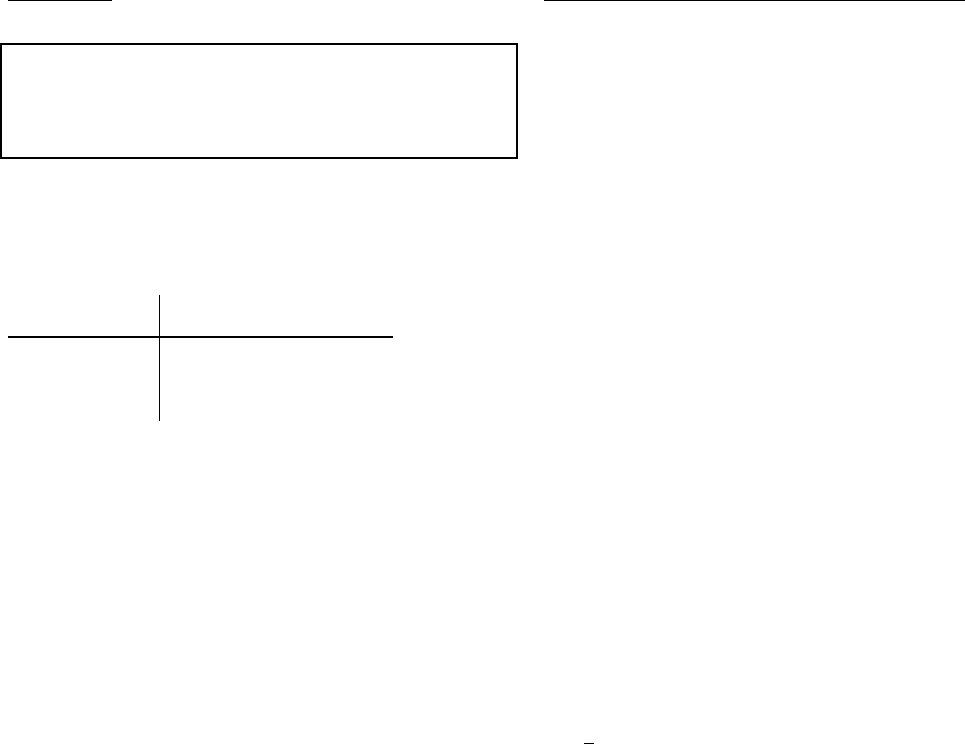
English Instruction for use Freezer
3
Warning!
Any refrigerant spilling out can injure your eyes.
In the event of eye contact with the refrigerant, wash your
eyes instantiy under plenty of running water
and
call/consult a doctor (an eye specialist) immediately..
The appliance, according to its climate category,
is meant for use at certain room temperatures. These
temperatures should not be exceeded! The
climate category for your particular appliance is marked
on the rating plate. The categories are:
name of climate
category
suitable
room temperatures
SN + 10°C bis + 32°C
N
+ 16°C bis + 32°C
ST + 18°C bis + 38°C
T + 18°C bis + 43°C
4 The rating plate
The rating plate with the technical data is affixed at
the side on the inner wall or on the back of the appliance.
Take a note of the technical data
Copy here below the technical data from the rating plate
so that it is easily accessible without having to move the
appliance
Model- / Type T°..............................
Gross capacity........................ Liter
Net capacity ................. Liter
Operating voltage .................. V / 50 Hz
Maximum absorbed powe (W) Watt
Safety fuse (A) ................... Amp
Power consumption .............. kWh/24h
Freezing capacity .................. kg/24h
5 Connecting up your appliance to the mains
Your appliance must be connected only to a grounded
Power socket which complies with relevant standards
And has been installed by an authorised specislist.
Before you plug in your appliance to the power
socket, make absolutely sure that the voltage (V) and
the safety fuse (A) for the main fuse box stated on the
appliance's rating plate match your electrical supply.
If these do not match, notify the nearest
service department or your dealer immediately.
The appliance must not be connected up to an
inverse
rectifier (e.g. solar panels).
■ The appliance is not to be connected to an
inverter
e.g. solar power panels.
■ The appliance is not to be connected via an extension
cable.
6 Using your appliance
a) Switching on / off and Selecting the
Temperature Temperature dial (Thermostat)
The temperature dial switches the appliance on and off
and sets the cooling temperature
b) Switching on the appliance:
Turn the temperature controller clockwise. The appliance
is switched on. ( Turn the controller only as far
as the stop, otherwise it will be damaged)
■ The interior light is switched on (not fitted
to all models )
■ The compressor runs unril the set temperature
is reached inside the appliance.
■ The internal temperature is shown in the display (not
installed in all appliance models).
c) Temperature settings:
Turn dial left to lowest setting = slight cooling
Turn dial right to highest setting = lowest temperature
The temperature must be set according to:
■ he appliance's room temperature
■ quantity of stored food
■ how often the appliance is opened
We recommend a medium setting. You will soon
learn, through observation, which is the most suitable
setting for your requirements.
d) Switching off: Turn the controller
counterclockwise as far as the stop.
■ Interior light in fridge compartment goes out
■ Compressor is switched off
■ The temperature display (where fitted) goes out
7
Freezer compartment
The 3- star (***) or 4-star (*/***) freezer compartment
is suitable for storing deep frozen food
(already frozen food), for freezing and short-term
(2-3 weeks) storage of small quantities of fresh food,
also for preparing ice cubes and ice creams, sorbets etc.
Be sure to comply with the producer's directives
on the storage period for frozen food.
ATTENTION!
Freezer compartments with a 2-star designation (**)
reach - 12℃ and colder.
Freezer compartments with a 1-star designation (*)
reach - 6℃ and colder.
They are therefore not suitable for deep freezing and
for the long-term storage of fresh food.
However, depending on their type, fresh food or
deep frozen food can be kept here for 3 to 5 days longer
than in the fridge compartment.
So-called ice compartments (no star designation) reach
0℃ and colder. They are the least suitable for
freezing and long-term storage of food.
However, all the above mentioned compartments
are excellent for preparing ice cubes.
The cooling temperature is set via the
temperature controller. A temperature of - 15℃
is necessary to freeze fresh food and for the
long-term storage of food. At this temperature the
growth of micro-organisms is largely inhibited. Once
the temperature rises above 10℃,


















